THEATRE
Control Alt Delete — ‘Expelled’ is the hilarious antidote to social media you didn’t know you needed

Craig Freimond is a masterful director of comedy. He finds touches of humour everywhere, moments within moments, jokes within jokes, and he underscores them with meaning and deeper insight. He’s a great companion for Rosalind Butler’s gorgeous new play about our online ineptitude. It may just be the year’s most hilarious window onto contemporary life, brought to life by three fine actors.
Frighteningly, Expelled, a new play by Rosalind Butler about the toxicity of social media and its ramifications for people in the real world, does not really say anything we do not already know.
Rather, it serves another need, the one that requires us – stupid humans that we are – to be reminded, repeatedly like naughty children, of our proclivity for indulging in things we know are bad for us. Butler’s play does the reminding very well. To the extent that in some ways it is almost like watching a documentary. A spectacularly funny documentary with abundant narrative twists, but in the manner that it turns the lens onto real life, right now, unfolding in real time, it often feels almost excruciatingly close to the bone. Because we know these people, we are these people, and their dramas feel like the messed-up stuff of everyday life.
We are addicted, and, as the play deftly points out, we’re addicted in more ways than we realise.
The object of our compulsion is social media, and by extension, all the virtual spaces and metaverses that exist as a result of our endless involvement with these online realms. The play is a cautionary tale about (or perhaps a playwright begging us to reconsider) the extent to which we willingly give up something of ourselves in exchange for the apparently miraculous ability to stick our noses into just about anyone else’s business.
Sure, technology has granted us a form of virtual omniscience, but at what cost?
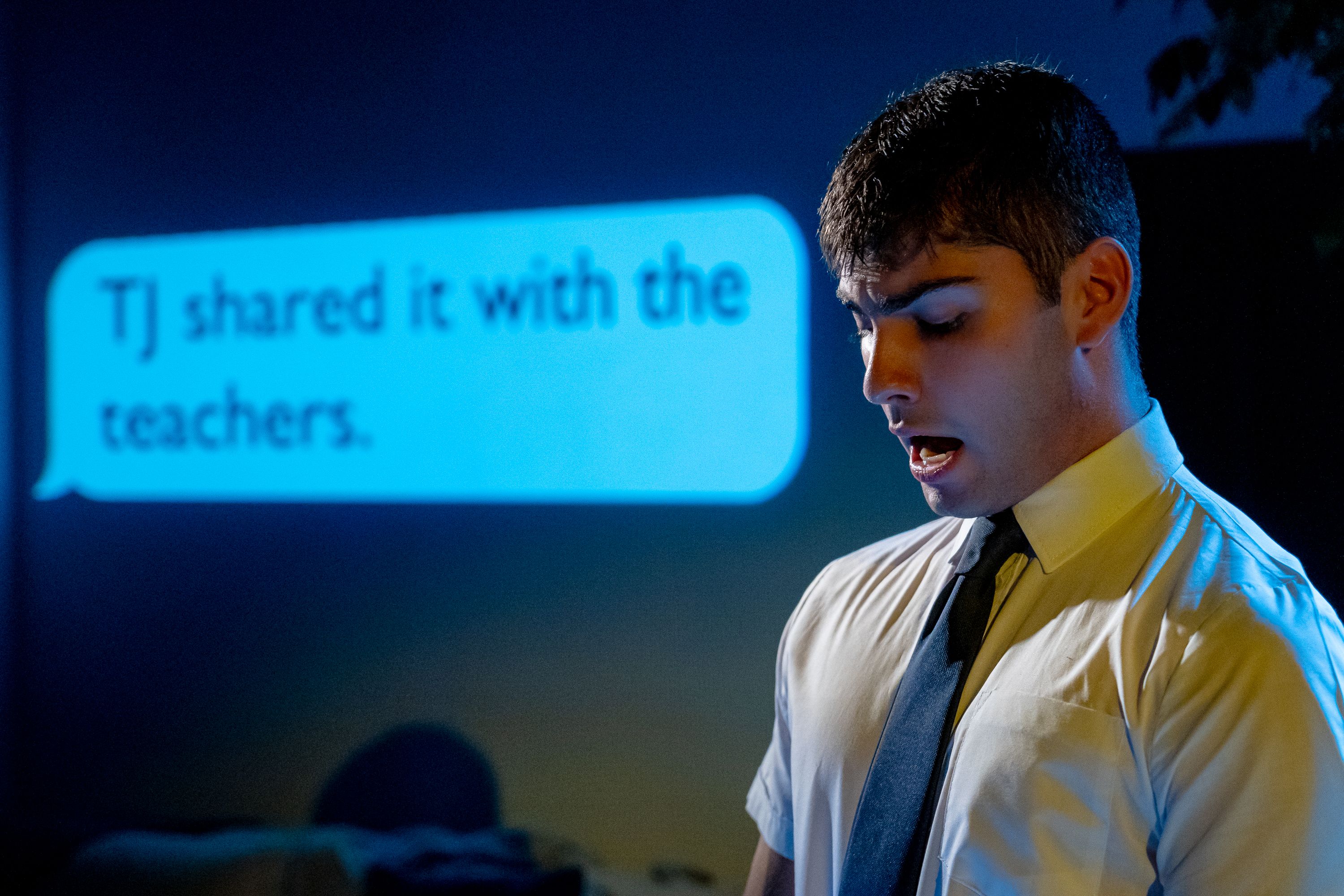
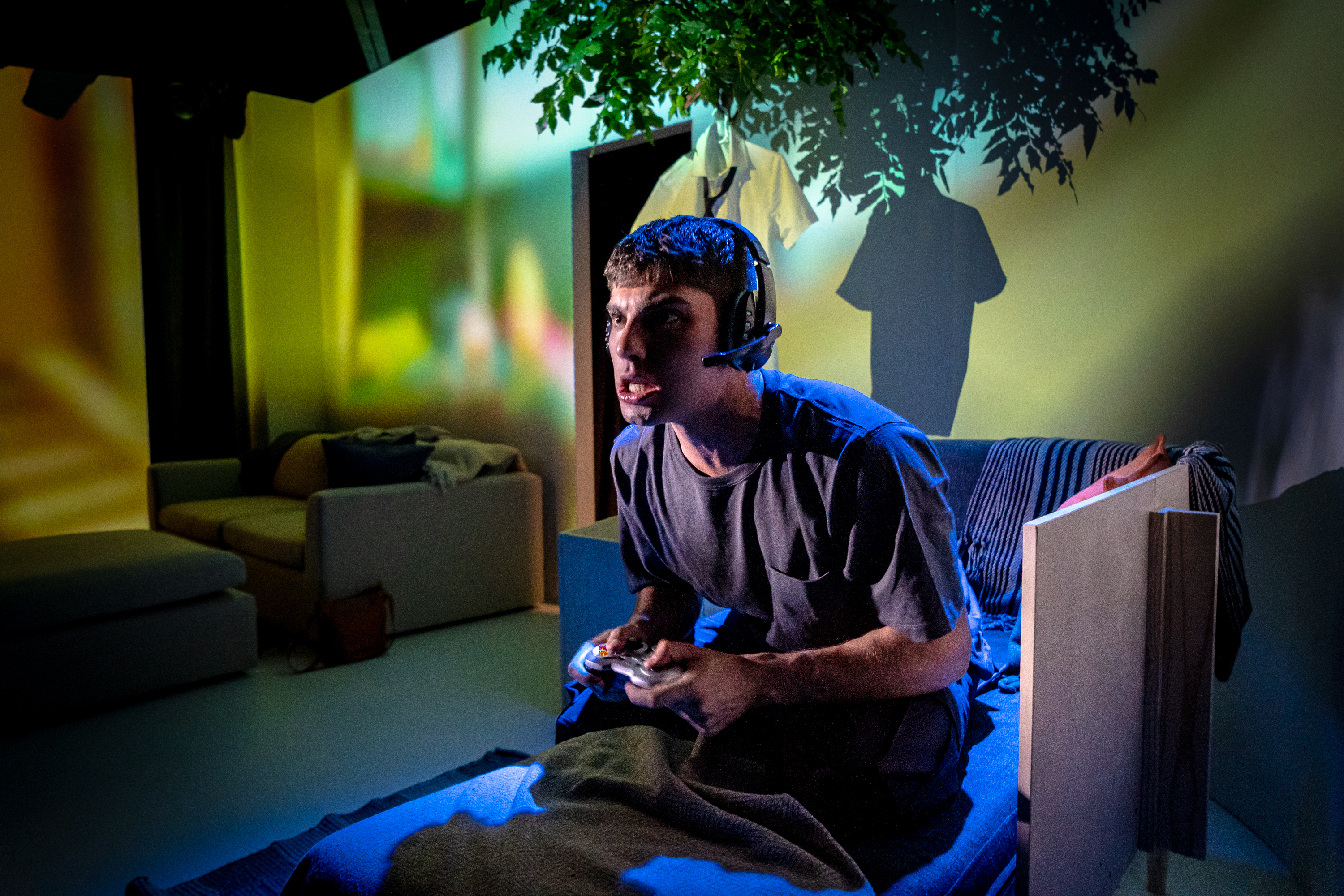
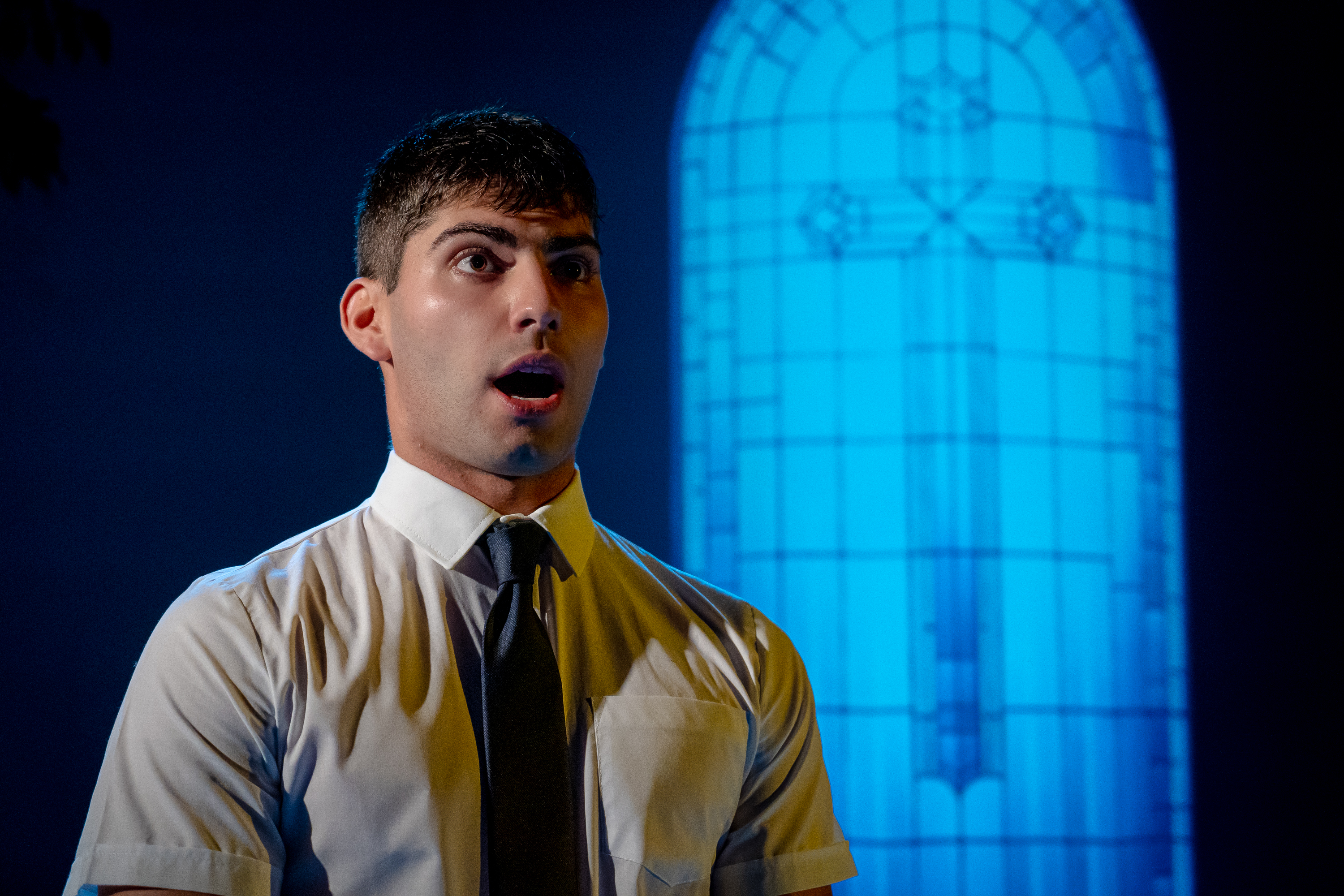
Nicolas Hattingh in ‘Expelled’. (Photo: Daniel Rutland Manners)
There is precisely one moment in the entire play when a cellphone is used for good, and that’s when middle-aged Rich, finally giving in to a suppressed desire to rekindle a long-lost romance with his wife, uses the device that’s seemingly permanently tethered to his hand to play a song that was once the backdrop to their earlier romance.
Rich, a distant dad, wound-up-tight husband and property developer looking for a break, is played with brilliant intensity and tremendous humour and humanity by Antony Coleman. He is for much of the play so anxious about a pending deal, so keenly hooked into information that filters endlessly through his phone, that he often looks as though steam is about to burst through the top of his head.
He is also a hapless father who must be driven to the pits of despair before he connects with his son in any real and meaningful way. When he does, it’s heartbreaking.
Rich’s often frantic and about-to-explode wife, Lou, is the worst offender in the family when it comes to her online activity. Played by an alarmingly funny Charmaine Weir-Smith, at one point she hides her phone under a cushion in an attempt to get away from its persuasive pull, but it takes just a few moments before it’s back in her hand and she’s once again scrolling, judging, feeling judged.

Nicolas Hattingh and Charmaine Weir-Smith in ‘Expelled’. (Photo: Daniel Rutland Manners)
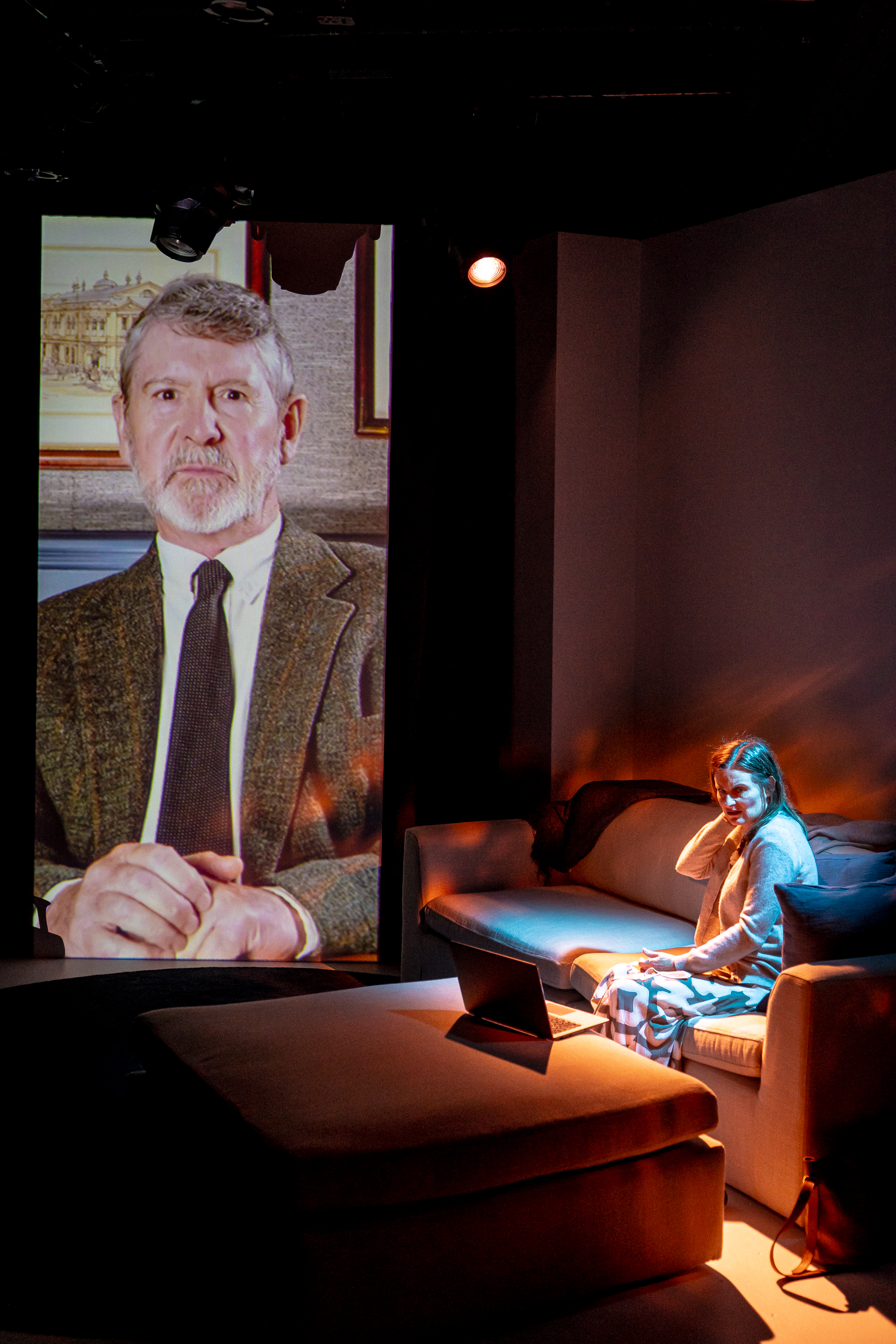
Graham Hopkins and Charmaine Weir-Smith in ‘Expelled’. (Photo: Daniel Rutland Manners)
Facebook’s takeover of Lou’s imagination is catastrophic, glimpsed in surreal sequences that use backdrop digital projections to showcase a kind of fever dream of her virtually colonised mind: visions of endless images, presumably AI-generated or Photoshopped; the sassy quotes; the blobs of FOMO-inducing information from friends on idyllic vacations.
Into the mix is the shame of being at home while two separate friends are on Grecian islands, living their best lives; and the vindication and triumph she feels when one of those friends turns out to be faking her time away.
The point is driven home again and again: social media, by some bizarre act of malevolent transmutation, turns people, whether we know them or think we know them, into frenemies, people we pretend to love/like/care about (or whatever the chosen emoji really means), but whose lives we secretly scrutinise for chinks, perhaps in hopes of bolstering our own self-esteem.
Our addiction has us trapped. We are prisoners of the endorphin kick we seem to get from this bizarre Stockholm syndrome fascination with looking and scrolling. Social media has, if we’re honest, made us dumb.
The tension in Butler’s play is centred not on Lou and Rich, however, but on their slightly naïve son, Alex. Played by a wide-eyed, fresh-faced, thoroughly charming Nicolas Hattingh, Alex comes off as a regular, wholesome matric lad who gets up to mischief and with his good looks and decent demeanour could probably get away with murder. Instead, he’s well-meaning, has his heart in the right place and – like most teenage boys – does stupid things.
Butler has concocted a scenario that is all too real, all too possible. At Alex’s privileged and expensive school, something extreme has happened. Something awful and vile – a real-world scandal brought on by a slice of online sensation. A video that Alex and some classmates have made has gone viral, prompting an outcry. Some folks are baying for blood. Others, like Alex’s parents, are horrified by the spiralling consequences of their son’s stupidity.

Antony Coleman Charmaine Weir-Smith and Nicolas Hattingh in ‘Expelled’. (Photo: Daniel Rutland Manners)

Antony Coleman and Charmaine Weir-Smith in ‘Expelled’. (Photo: Daniel Rutland Manners)
The central question for Alex’s parents is whether he’ll be expelled. But, of course, the real ramifications of the video go beyond the procedural politics of the offence that’s been committed. Unlike the world before social media’s capacity to send information to every corner of the online realm, Alex’s error in judgement has been put out there for the entire world to judge.
This becomes the slow-burn torture Alex must endure. Not only is he left to stew in his adolescent guilt and embarrassment, but he must face cancellation, getting dumped, and the aftermath of trying to remedy his mistake only to put his foot in his mouth during an online apology video.
Of course, in the arena of the online public square, it’s questionable whether or not apologies even have any meaning. Alex repeatedly expresses remorse, tells everyone he’s sorry, but it’s clear that in our digital-first world there is no such thing as forgiveness, no means of escaping the repercussions of our actions once they’re online.
If social media is meant to be a stand-in for the town square public gathering places of old, then it is just as much a place of public execution. Once somebody is tried and convicted in that public arena, they are cancelled with little chance of reprieve. And while such punishments are meant to keep people in check, the downside is that – like being expelled from school – they offer little opportunity to learn from our mistakes. How do we expect wrongdoers to evolve if their heartfelt apologies go unacknowledged and they’re permanently banished from the public sphere?
While the implications of his actions are not entirely lost on Alex, there is his repeated reminder that the offensive video, while a terrible symptom of moral vacuousness, is only a joke. That, while its contents are extremely ugly and malicious, the kind of harm it represents is contextually different from acts of actual violence and abuse that pervade the real world.
Alex’s situation spotlights an ethical split at the centre of our current culture crisis: the play raises questions about the war over wokedom and the proliferation of cancel culture debates. At its heart there’s that enormous, ethically challenging question about whether those who joke about evil are really as vile as those who commit evil acts.

Antony Coleman and Charmaine Weir-Smith in ‘Expelled’. (Photo: Daniel Rutland Manners)
For Butler, this is just the tip of the iceberg. Myriad more ramifications of our online lives are explored in her tremendously detailed script. There’s the violent gaming Alex takes part in, for example, to the point of losing his temper so uncontrollably in one scene that his subsequent screams of despair momentarily broke my heart.
And there’s the ease with which our devices are sites of sexualised activity: nude pictures are sent, video calls are used for remote sex, pornographic content is accessed and distributed with the touch of a button. In the context of referencing porn’s proliferation online, Expelled includes one of the funniest beaver jokes one will ever witness. It’s pretty innocent, yes, but just watch the actors’ faces as they stifle their laughs in order to get through this scene – and countless more that are as achingly funny.
Less amusing, though, is the issue of consent and how decisions to cancel someone – no questions asked – can be made with the ease of simply blocking them. Or how a recently dumped boyfriend can be relegated to the heap of undesirables with the swipe of a thumb.

Amelia Smith, Charmaine Weir-Smith and Nicolas Hattingh in ‘Expelled’. (Photo: Daniel Rutland Manners)
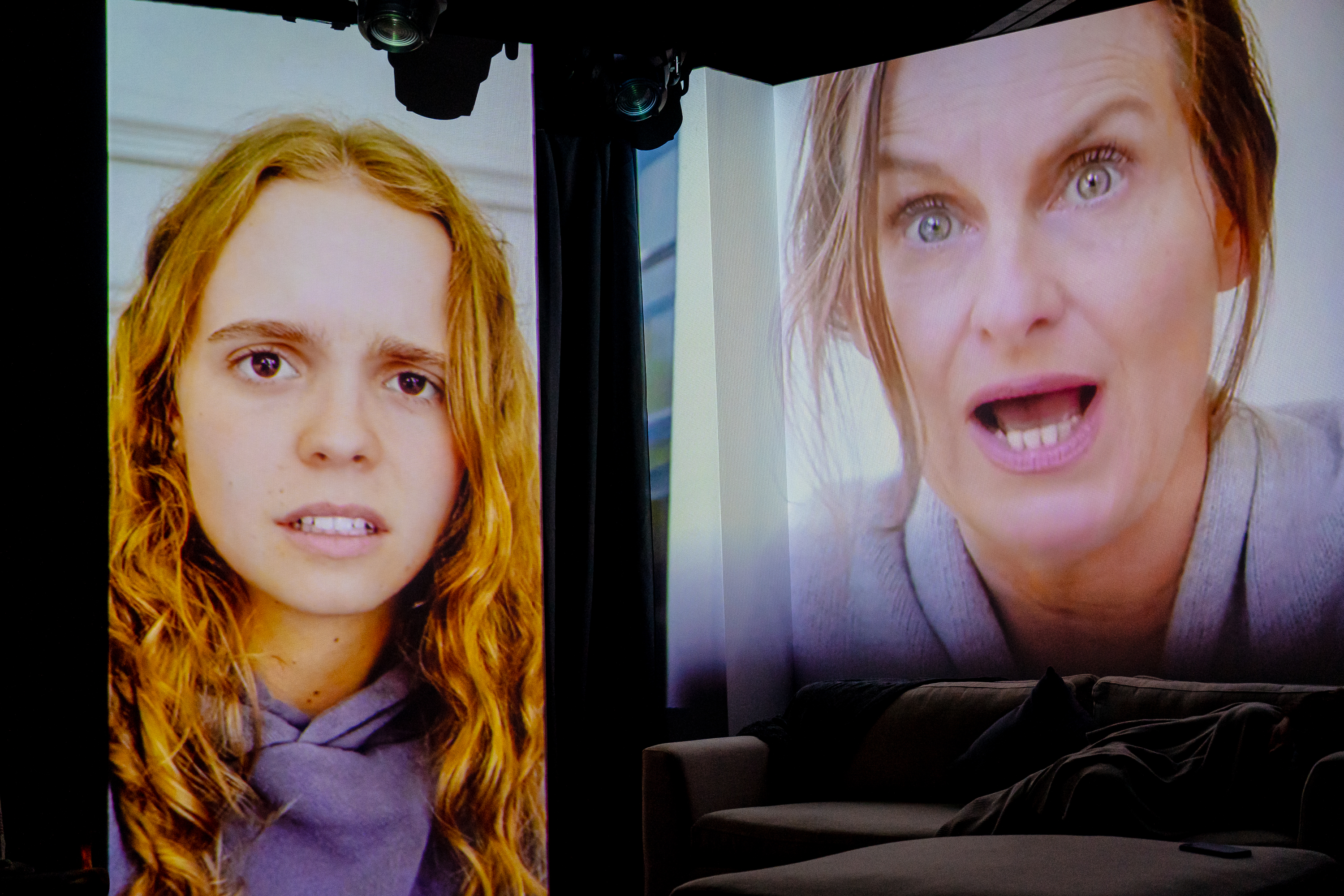
Amelia Smith and Charmaine Weir-Smith in ‘Expelled’. (Photo: Daniel Rutland Manners)
Much of this is the stuff of epic frustration – for the characters and for us in the real world. If it’s catharsis you’re looking for, however, the play is less forthcoming. In fact, Butler’s characters regularly arrive at moments of such furious vexation that it becomes impossible to suppress the desire to rant, rave, threaten, swear inappropriately or simply shout in vain. There’s a moment when Alex loses his marbles completely and it broke my heart yet again to realise that all he could do was scream at the tiny piece of technology he was holding in his hand.
There are plenty of moments, in fact, when I could feel the playwright using her meticulous dialogue to metaphorically pull her own hair out, expressing that terrible sense of knowing that the battle has been lost. Even so, for the pure joy of spending 90 minutes being cleverly entertained, Expelled is worth putting your phone away for. DM
Expelled is playing in Cape Town at the Baxter’s Golden Arrow Studio until 2 March and will transfer to the Market Theatre in Joburg from 7 to 31 March.




 Become an Insider
Become an Insider
Hoping that the play either comes to Durban or that they come up with a tech idea of allowing folk from far off to watch. No! Not on our phones!
Whilst I thoroughly enjoyed the show, there is no excuse for what those boys did. Be it today or yesterday or tomorrow. Some things should just never be joked about and for that they deserved to be punished. Really enjoyed the play, especially the Dad.